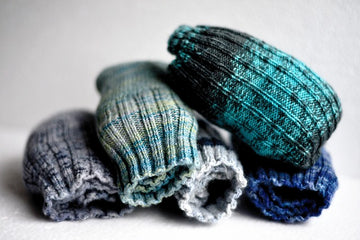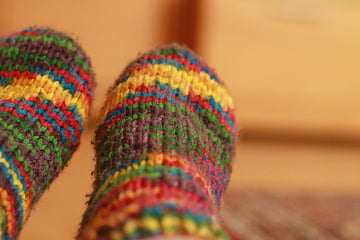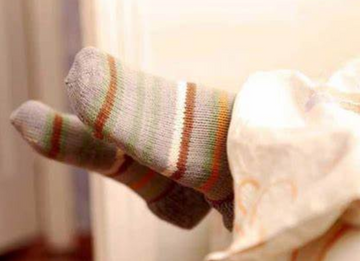
Compression socks are popular for improving circulation and reducing leg pain, swelling, and fatigue. They work by applying gentle pressure to the legs, which helps blood flow back to the heart. While compression socks are beneficial during the day, this article explores whether or not you should wear them to bed.
Can You Wear Compression Socks to Bed
While compression socks reign supreme for improving circulation in folks with vein issues, their benefits extend far beyond. From those battling leg swelling to all-day standers, expecting mothers, jet-setters, and even athletes, many swear by these magic socks. The secret lies in the gentle squeeze they provide, aiding blood flow back to the heart and relieving leg pain, achiness, and puffiness.
However, when you hit the hay, the pressure game changes. Gravity chills out at night, so your legs aren't under the same strain as when you're upright. This translates to no need for compression socks while you sleep. While designed for day-long comfort, most people prefer to give their legs a breather at night and ditch the compression stockings for some shut-eye.
Benefits of Wearing Compression Socks to Bed
Gravity plays a major role in why compression socks improve circulation. When you're lying down, gravity's effect on blood flow in your legs is significantly reduced. This means the circulatory benefits of compression socks are minimal at night.
Compression socks are designed for daytime wear, and some people find them constricting or uncomfortable for sleeping. Letting your legs relax without any compression might feel more natural and promote better sleep.
For most healthy individuals, there's no need to wear compression socks to bed. However, if you have specific concerns or medical conditions, talk to your doctor to see if nighttime compression could be right for you.
Can You Wear Compression Socks to Bed During Pregnancy
Pregnant women with a high risk of blood clots due to medical history or other factors may need to wear medical compression stockings daily as advised by their doctor. These can be worn throughout the day, but it's common practice to remove them at night for comfort and skin health.
For most pregnant women experiencing leg discomfort or mild swelling, compression socks can be a helpful option. However, nighttime wear for these is generally unnecessary and might be uncomfortable. It's best to discuss your specific situation with your doctor to determine if compression socks are right for you and whether nighttime wear is beneficial.
Should Diabetics Wear Compression Socks to Bed
In general, diabetics don't necessarily need to wear compression socks to bed. Compression socks are most beneficial when you're up and about, since gravity works against circulation in your legs. Lying down removes this effect.
However, there are certain situations where a doctor might recommend wearing compression socks to bed for diabetics:
- If you have poor circulation or swelling in your legs: Compression socks can help improve circulation and reduce swelling.
- If you experience pain at night: Compression socks can provide some pain relief.
- If you have neuropathy (nerve damage): Compression socks can help improve sensation in your feet.
Talk to your doctor before you start wearing compression socks to bed, especially if you have diabetes. They can help you decide if they're right for you and recommend the right pressure level.
Should You Wear Compression Socks to Bed for Varicose Veins
Compression socks can be helpful for people with varicose veins, but whether you should wear them to bed depends on a few factors.
Here are some things to consider before deciding whether to wear compression socks to bed:
- The severity of your varicose veins
- Your personal comfort level
- Your doctor's recommendation
If you are considering wearing compression socks to bed, it is important to talk to your doctor first. They can help you decide if compression socks are right for you and recommend the right level of compression.
In general, if your varicose veins are mild and you do not have any discomfort, you may not need to wear compression socks to bed. However, if your varicose veins are severe or you are experiencing symptoms, wearing compression socks to bed may be helpful.
Should I Sleep with Compression Socks Sprained Ankle
Wearing compression socks overnight for a sprained ankle can be beneficial in managing swelling and providing support. However, it’s important to ensure they are comfortable, properly fitted, and used under medical supervision to avoid any potential complications. Sleeping with compression socks on a sprained ankle can provide benefits, but it should be done with caution and ideally under medical advice.
Should I Wear Compression Socks to Bed After Surgery
Whether or not to wear compression socks to bed after surgery depends on the type of surgery, your overall health, and the specific recommendations of your healthcare provider.
For many surgeries, it's typically recommended to wear compression socks continuously for the first 24-48 hours to significantly reduce the risk of blood clots forming (Deep Vein Thrombosis, or DVT) and to help control postoperative swelling through constant pressure.
You can wear them regularly throughout the day but remove them at night for sleeping once swelling and discomfort improve.
Why Should You Not Wear Compression Socks at Night
In summary, while compression socks are beneficial during the day for improving blood flow and reducing swelling, it is typically best to remove them at night to allow your legs and skin to rest, unless otherwise directed by a healthcare professional.
- Reduced Benefit: Compression socks work by squeezing your legs to improve circulation against gravity. When you're lying down, gravity isn't a factor, so the compression doesn't offer the same advantage.
- Comfort and Skin Health: Some people find compression socks uncomfortable to sleep in, especially if they're not used to them. Tight socks can also irritate the skin, and nighttime is a good chance to give your legs a break from constriction.
That said, if you find compression socks relaxing or helpful for whatever reason, it generally won't hurt you to wear them to bed. Just know that the benefits are minimal compared to wearing them during the day. Talk to your doctor if you have any concerns.
FAQ
How many hours should you wear compression socks?
In general, you can safely wear compression socks all day long. They are designed for extended wear and provide the most benefit when worn for long periods. However, it's always recommended to take them off before going to sleep
Can you sleep in compression socks for restless legs?
Studies have shown compression socks can be helpful for restless legs syndrome (RLS). They may improve circulation and reduce discomfort, leading to better sleep.
It's always best to consult your doctor before sleeping in compression socks, especially if you have any underlying health conditions. They can advise you on the right type and compression level for your needs and whether sleeping in them is safe for you.
Is there a downside to wearing compression socks?
Compression socks are generally safe to wear, but there can be some downsides if you don't wear them correctly.
- Improper fit: If the socks are too tight, they can cut off circulation and cause pain, numbness, or tingling. If they are too loose, they won't provide the necessary compression and won't be effective.
- Skin irritation: Compression socks can irritate the skin, especially if you have sensitive skin or dry skin.
- Discomfort: Some people find compression socks to be uncomfortable, especially when they are first starting to wear them.
Should you elevate your legs when wearing compression socks?
You don't necessarily need to elevate your legs all the time while wearing compression socks. They work together for better circulation, but compression socks provide some benefit on their own.
Elevating your legs whenever possible is still recommended though, as it further enhances the effectiveness of compression socks in reducing swelling and improving blood flow.
Should I wear compression socks if I sit all day?
Overall, compression socks can be a helpful tool for those who sit all day, but they shouldn't be a substitute for a healthy lifestyle that includes regular movement.
- Improved Circulation: Sitting for long periods restricts blood flow in your legs, which compression socks can help counteract. The gentle squeeze they provide encourages blood to move back towards your heart, reducing the risk of pooling and potential clotting.
- Reduced Swelling: Sitting can also lead to leg and ankle swelling. Compression socks can help minimize this by promoting better fluid circulation.
- Less Fatigue and Aching: Improved blood flow can also help reduce feelings of tiredness and achiness in your legs that often come with sitting for extended periods.
Final Words
In conclusion, while compression socks offer many benefits during the day, there is little to no advantage to wearing them at night for most healthy people. Gravity, which compression socks work against, has minimal effect when you are lying down. Additionally, some people find compression socks uncomfortable for sleeping. However, if you have certain medical conditions, such as varicose veins, diabetes, or a sprained ankle, your doctor may recommend wearing compression socks to bed. Ultimately, the decision of whether or not to wear compression socks to bed is a personal one. If you are considering wearing them, talk to your doctor to see if they are right for you.
Read More:
How to Measure for Compression Socks
How Do Compression Socks Work
Why Do My Legs Ache After Wearing Compression Socks
How to Put On Compression Socks
When to Put on Compression Socks for Flying
Are Flight Socks the Same as Compression Socks







